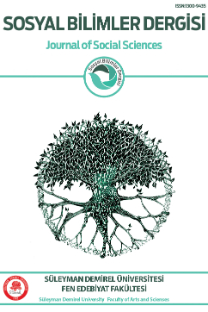Reviving the feminine motifs in the oral tradition of little red riding hood': Angela Carter's the werewolf' and Tanith Lee's wolfland'
Angela Carter The Werewolf (1979) ve Tanith Lee Wolfland (1989) başlıklı öykülerinde, Kırmızı Başlıklı Kız masalını, bu masalın sözlü gelenekteki örneğinde bulunan kadın bakışaçısını abject temsiller üzerinden vurgulayarak 20.yy sonlarında yeniden yorumlamışlardır. Bu öykülerin kadın kahramanları, kurtadama dönüşmüş olarak temsil edilen abject büyükanneleriyle özdeşleşmek için ormana doğru yola çıkarlar. Carter ve Lee, erkek kurt figürünü, büyükanneyi ve kurdu tek bir imgede birleştirerek yok eder. Ayrıca, bu akışkan ve çoğul imgeyi anneyle olan bağı, büyükanneden torununa geçen kadınsal beceri ve bilgileri, öznenin ancak ötekiyle bir bütün oluşturabileceğini vurgulayarak soyağacından gelen bir miras olarak sunarlar. Böylece, kadın kimliğini ataerkil otoritenin elinden kurtararak Perrault ve Grimm Kardeşlerin Kırmızı Başlıklı Kız masalında bulunan erkek egemen cinsiyetçi söylemi yıkarlar.
Angela Carter ın The Werewolf ve Tanith Leenin wolfland başlıklı öykülerinde kırmızı başlıklı kız masalının sözlü geleneğinde bulunan kadınsal öğelerin yeniden canlandırılması
ABSTRACT Angela Carters The Werewolf (1979) and Tanith Lees Wolfland (1989) are two late twentieth century rewritings of Little Red Riding Hood which revive the feminine perspective found in its oral version through adopting abject representations. The protagonists of these stories travel into the forest in order to identify with their grandmothers represented in abject forms as werewolves. By combining the grandmother and the wolf in a single image, both Carter and Lee eliminate the figure of the male wolf and they introduce this fluid and plural image as a celebration of genealogical inheritance that emphasizes the maternal bond, the transmission of female skills and female knowledge from the grandmother onto the granddaughter, and the union of the self with the other. Thus, they subvert the male - dominated gendered discourse embedded in the literary versions of the tale by Perrault and the Brothers Grimm by liberating female identity from patriarchal authority.
___
AKTARI, Selen. Abject Representations of Female Desire in Postmodern British Female Gothic Fiction . (unpublished doctoral dissertation), Middle East Technical University, 2010.BECKER- LECKRONE, Megan. Julia Kristeva and Literary Theory. Houndmills: Palgrave Macmillan, 2005.
BECKETT, Sandra L., Little Red Riding Hood. The Greenwood Encyclopedia of Folk Tales and Fairy Tales Volumes 1 -3. Ed. Donald Haase. Westport: Greenwood Press, 2002. pp. 583 - 8.
BETTELHEIM, Bruno. The Uses of Enchantment: The Meaning and Importance of Fairy Tales. NY: Vintage Books, 1977.
CARTER, Angela. The Bloody Chamber and Other Stories. London: Vintage, 2006.
CASLAV COVINO, Deborah. Amending the Abject Body: Aesthetic Makeovers in Medicine and Culture. Albany: State University of New York Press, 2004.
FROMM, Erich. The Forgotten Language: An Introduction to the Understanding of Dreams, Fairy Tales and Myths. New York: Grove, 1955.
GUTENBERG, Andrea. Shape- Shifters from the Wilderness: Werewolves Roaming the Twentieth Century. The Abject of Desire: The Aestheticization of the Unaesthetic in Contemporary Literature and Culture. Eds. Konstanze Kutzbach and Monika Mueller. Amsterdam: Rodopi, 2007. pp. 149 -180.
KELTNER, Stacey K. Kristeva: Thresholds. Cambridge: Polity Press , 2011.
KRISTEVA, Julia. Powers of Horror: An Essay on Abjection. Trans. Leon S. Roudiez. NY: Columbia UP, 1982.
LAU, Kimberly J. Erotic Infidelities: Angela Carters Wolf Trilogy. Marvels & Tales: Journal of Fairy- Tale Studies Vol. 22. No. 1. (2008): 77 -94, Project Muse. Web. 4 Feb 2015.
LEE, Tanith. Wolfland. Dont Bet on the Prince: Contemporary Feminist Fairy Tales in North America and England. Ed. Jack Zipes. Aldershot: Scolar Press, 1993. pp. 122 - 147.
MCAFEE, Noellë. Julia Kristeva. NY: Routledge, 2004.
ORENSTEIN, Catherine. Little Red RidingHood Uncloaked: Sex, Morality, and the Evolution of a Fairy Tale. NY: Basic Books, 2002.
WEST, Russell. Abject Cannibalism: Anthropophagic Poetics in Conrad, White, and Tennant Towards a Critique of Julia Kristevas Theory of Abjection. The Abject of Desire: The Aestheticization of the Unaesthetic in Contemporary Literature and Culture. Eds. Konstanze Kutzbach and Monika Mueller. Amsterdam: Rodopi, 2007. pp. 235 -54.
WISKER, Gina. Demisting the Mirror: Contemporary British Womens Horror. Contemporary British Women Writers. Ed. Emma Parker. Cambridge: D.S. Brewer, 2004. pp. 154-170.
VERDIER, Yvonne. Little Red Riding Hood in Oral Tradition. Marvels & Tales: Journal of Fairy- Tale Studies Vol. 11, Nos. 1 -2. (1997): 101 -23, JSTOR. Web. 4 Feb 2015.
ZIPES, Jack. A Second Gaze at Little Red Riding Hoods Trials and Tribulations. Dont Bet on the Prince: Contemporary Feminist Fairy Tales in North America and England. Ed. Jack Zipes. Aldershot: Scolar Press, 1993. 227 -59.
ZIPES, Jack.Preface. The Trials and Tribulations of Little Red RidingHood. Ed. Jack Zipes. New York: Routledge, 1993. pp. xi-xiii.
ZIPES, Jack.The Trials and Tribulations of Little Red Riding Hood. The Trials and Tribulations of Little Red Riding Hood. Ed. Jack Zipes. New York: Routledge, 1993. pp. 17 - 89.
- ISSN: 1300-9435
- Yayın Aralığı: Yılda 3 Sayı
- Başlangıç: 1995
- Yayıncı: Süleyman Demirel Üniversitesi, Fen-Edebiyat Fakültesi
Sayıdaki Diğer Makaleler
Modern bir aydın hareketi olarak yeni Osmanlılar ve islam dünyası
Einsatz des märchens im fremdsprachlichen Deutschunterricht
Modern edebiyat dünyası ile yüzleşmek: 1900-1920 arası William Dean Howells
Türkiye müze ve türbelerindeki mumyaların tarihi ve bugünkü durumları
Hayranlık, dostluk ve çıkar üçgeninde Türk- Alman İlişkileri
Pavlus felsefesinde gizlenen gnostik unsurlar
Re- creating the doppelganger in peter ackroyd's the casebook of victor frankenstein
20. Yüzyıl başlarında İstanbul hapishane -i umumi 'de mahkûmların üretim faaliyetleri
Refet Paşa'nın İstanbul'a Girişi ve tıbbiyelilerce karşılanışı
